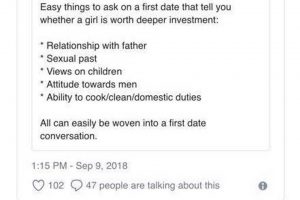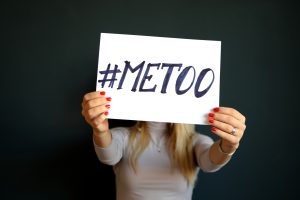#MeToo: 5 Questions to Ask to Guarantee No Second Date
Earlier today I was scrolling through my social media when I saw that one of my male friends had shared a rather upsetting post.
I was instantly taken aback at the inherent misogyny within the post. (Misogyny is the dislike, contempt for, or prejudice against women. It can be manifested in many different ways such as social exclusion, sexual discrimination, violence against women, and belittling of women amongst many others.)
Ultimately, the post proposed the idea that a woman must adore her father, behave in a conservative sexual manner in order to avoid slut-shaming, apologize for male toxicity, and be a good housewife in order to be valued. These are the types of ideas that antagonize the #MeToo movement. These are the types of ideas that blame women for simply making their own decisions.
Since I began at UVic, the concept of agency has come up in multiple of my classes. Agency refers to an agent – an autonomous being – with the capacity to act. In simple terms, this refers to a person who can make choices for themself.
My classes have discussed time and time again how female agency is often hindered or taken away through misogynistic constructs. In regards to the post that my friend shared, I was heartbroken that he and others who had shared the post seemingly believed that women should behave according to men’s desire and standards.
The idea that men are superior or in power over women has led to detrimental situations that flood the foundation of the #MeToo movement. Seeing this post really bothered me, so I looked for posts regarding the movement in order to better understand the power dynamics, and hopefully better understand how to respond to misogyny and stand up for female agency. After looking through a number of posts, I managed to sum up a few ways to support the #MeToo movement and ultimately bring power back to women.
1. Recognize and Understand
First and foremost, in order to understand the movement you have to understand where it came from and why it exists. Understanding rape culture means understanding that it originated with toxic masculinity, not men themselves. Men are not the target here. Anyone can be a victim to #MeToo, this is not about picking and choosing who we do and don’t believe and support.
2. Listen
The first step to understanding power dynamics is listening to and believing the stories of the powerless. Therefore, listen to the stories of the victims and hear what they have to say about rape culture and their experience. These are not easy stories to share, so respecting the victim’s vulnerability not only shows your support, but it also allows you to empathize with the individual sharing such a raw experience.
3. Stand Up
If you see an inherently sexist post or notice your friend discussing someone in a degrading manner, say something. Just as you educated yourself, educate them on how harmful those ideas can be.
Simply remember that everyone has the right to be in control of their own agency, and that #MeToo does not need to be a forever movement. We can bring about change.









What a thoughtful piece, Morgan. I think this is such an important issue, and you discussed it in such an authoritative manner as for others to understand the issues in this topic. We need more people like you to educate and speak their truth! <3
Thank you so much, I’m glad that others understand the complexity and importance of this issue. <3
Thank you for taking the time to deconstruct how harmful a post like that can be and why. I think it’s great that you give tangible steps for action that can easily be taken!
Thank you for reading! I’m glad I was able to show how misogyny can be interwoven into different aspects of our culture.
You say that your agency/female agency has been hindered through the acts of mysoginistic constructs…can you elaborate on the specific constructs you experience which hinder your ability to make your own choices?